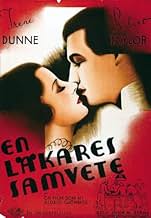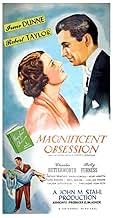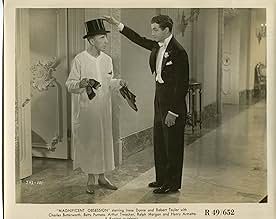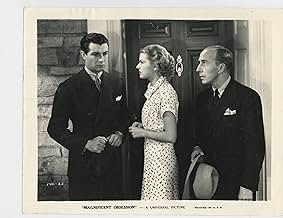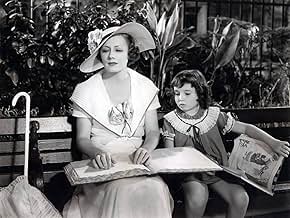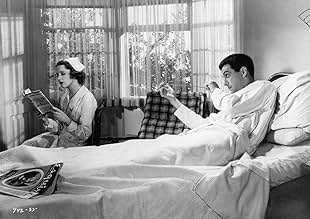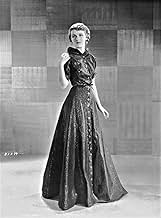अपनी भाषा में प्लॉट जोड़ेंThe life of spoiled rich Robert Merrick is saved through the use of a hospital's sole resuscitator, but because the medical device cannot be in two places at once, it results in the death of... सभी पढ़ेंThe life of spoiled rich Robert Merrick is saved through the use of a hospital's sole resuscitator, but because the medical device cannot be in two places at once, it results in the death of Dr. Hudson, a selfless, brilliant surgeon and generous philanthropist. Merrick falls for ... सभी पढ़ेंThe life of spoiled rich Robert Merrick is saved through the use of a hospital's sole resuscitator, but because the medical device cannot be in two places at once, it results in the death of Dr. Hudson, a selfless, brilliant surgeon and generous philanthropist. Merrick falls for Hudson's widow Helen, although she holds him responsible for her husband's demise. One day... सभी पढ़ें
- पुरस्कार
- कुल 3 जीत
- Amy
- (बिना क्रेडिट के)
- Chief Inspector
- (बिना क्रेडिट के)
- Man on Pier
- (बिना क्रेडिट के)
फ़ीचर्ड समीक्षाएं
Randolph's character seems more important in Stahl's version.His theory is certainly moving:You've only got what you give and you should not expect any award.Merrick tries to apply this theory,first because he wants to seduce the wife of the philanthropist/doctor who indirectly died because of him,because he was an alcoholic playboy.He has not really understood what Randolph tried to explain to him.The scene with the hobo comes as a comic relief,which is terribly needed in such a dark yarn.When ,as leaving the poor man,Merrick thinks he's got some divine reward,he's completely mistaken.A Christian movie,"magnificent obsession" sure is,as Randolph,in his second scene ,mentions the Christ. After all,his theory is not that much far from that of James Stewart's guardian angel in "it's a wonderful life".
Unlikelihoods are here there and everywhere,but it's the rules of melodrama.The story ,which includes death,blindness,moral and physical redemption,is not more far-fetched than westerns and thrillers plots.And life is so strange that it can turn sometimes into the most implausible melodrama;and like it or not,not necessarily with a happy end.
Taylor was in his second year in Hollywood, and saw some success in his earlier appearance in "Broadway Melody of 1936." Casting the character of the son from a wealthy family whose love for the bottle was more important than treating people decently was crucial for the John Stahl-directed movie. After several choices were considered to play opposite actress Irene Dunn, Taylor was selected, with positive results.
"Magnificent Obsession" bounces from one tragedy to the next, but contains shining examples of sacrificing oneself for the greater good of human kind. Taylor plays the wisecracking Robert Merrick, whose drunken accident nearly kills him, only to be saved by the local hospital's only ventilator. Trouble is, at the same time Robert was hogging the sole ventilator, the highly esteemed generous philanthropist Dr. Hudson dies because of the same hospital's lack of another ventilator. Dr. Hudson's younger wife, Helen (Dunne), loathes the young man whom she feels is responsible for her husband's death. Robert meets and falls for the widow (in real life Irene was 35 to Taylor's 24). Driving her home, he becomes aggressive in his passion. Helen escapes his clutches by jumping out of the parked car, only to be struck by a passing automobile. "When his character makes the transition from self-absorbed playboy to dedicated doctor and committed philanthropist," describes film reviewer Sean Axmaker, "you can see the guilt and regret in his face and the seriousness in his new demeanor."
The author of 'Magnificent Obsession,' Lloyd Douglas, a former church minister who is also known for his 1942 novel 'The Robe,' adopted the Bible's Gospel of Matthew passage "That thine alms may be in secret: and thy Father which seeth in secret himself shall reward thee openly" as a basis for both Dr. Hudson's generosity and Robert Merrick's remarkable turnaround as a Nobel Prize-winning brain surgeon. Merrick's focus on dedicating his life to cure the blind Helen sets up a tearjerker conclusion.
Taylor saw his fortunes in Hollywood increase after "Magnificent Obsession," a film where the actor was a loan-out to Universal Pictures. He began receiving substantial roles from his employer, MGM, after the studio realized what a gem it had in its stable. Ironically, the 1954 remake of the same book also boasted the career of another young actor who had been bouncing around in low budget adventure movies. Rock Hudson was selected for the Merrick role in director Douglas Sirk's "Magnificent Obsession." The film became a huge hit for Universal, catapulting Hudson into the limelight as Hollywood's new romantic star.
Robert Merrick (Taylor) is a drunken playboy who, one afternoon, falls off his sailboat and has to be resuscitated with the use of what's called in this film a "pulmotor," a device that forces oxygen into the lungs.
Unfortunately, the pulmotor was needed across the lake for an older man, a Dr. Hudson, who has had a heart attack, but because one isn't available, the man dies. When his wife (Dunne) and daughter (Betty Furness) arrive home, they get the horrible news. There is bitterness everywhere because Dr. Hudson was beloved, a fine doctor and an exceptional man, and Merrick is a drunken, rich loser.
At one point, Merrick meets a man (Ralph Morgan) who gives him the secret philosophy that Dr. Hudson lived by and taught him - give anonymously and without expecting repayment.
When Merrick spots Mrs. Hudson, he has no idea who she is and tries to pick her up. One day, he offers her a ride and "runs out of gas." As she's leaving the car to take a ride with someone else, a car hits her and she is badly injured - in fact, she's blinded.
Merrick now befriends her in the park, where she sits practicing her Braille. He doesn't identify himself - she calls him "Dr. Robert"; he tells her that he once had aspirations to be a doctor himself. He arranges for her to have a steady income, since Dr. Hudson gave most of his money away and only has worthless stocks - she thinks her husband's copper stocks are now worth a lot -- and then he arranges for some of the finest doctors in the world to meet in Paris and study her. She thinks it's because her husband was so highly regarded. Alas, the prognosis is that the doctors see no point in surgery. It goes on from there, assuming fabulous aspects.
This kind of melodrama was extremely popular in the 1930s; director Douglas Sirk loved this type of film and remade some of them in the '50s, giving them big, glitzy productions, and made some new ones as well.
Though today the plot seems ridiculous, because of the commitment and likability of the actors and the spiritual undertone that goes throughout the film, somehow one doesn't stop watching, and it sure worked well in 1935 and 1954.
Robert Taylor is gloriously handsome, known for his perfect profile, resonant speaking voice, and charming presence. I have never considered him much of an actor, but he was my mother's favorite, and I watch him every time he's on TCM in her honor. He holds the record for being employed by a studio the longest - 24 years with MGM, until it dissolved, and went on to more films, a successful television show, and he replaced Ronald Reagan on Death Valley Days.
Irene Dunne gives a lovely performance without histrionics or being overdone in any way.
Good movie? For what it is, yes.
क्या आपको पता है
- ट्रिवियाThis film is featured as a bonus on "Magnificent Obsession" (1954), released by the Criterion Collection, spine #457.
- गूफ़When operating on Helen's eyes, Merrick asks for an otoscope. He should have asked for an opthalmoscope. An otoscope is for ears.
- भाव
Robert Merrick: Take back to the cook and tell her that if she brings back again, I'm gonna buy this hospital and fire her and everybody else in it. I want some decent breakfast.
Nurse: It's the same breakfast we serve all the patients.
Robert Merrick: Yeah, but I am "The Special".
- इसके अलावा अन्य वर्जनAll prints now in circulation run 102 minutes.
- कनेक्शनFeatured in The Universal Story (1996)
- साउंडट्रैकRomeo and Juliet Fantasy-Overture
(uncredited)
Written by Pyotr Ilyich Tchaikovsky
Played under the opening credits
टॉप पसंद
- How long is Magnificent Obsession?Alexa द्वारा संचालित
विवरण
- रिलीज़ की तारीख़
- कंट्री ऑफ़ ओरिजिन
- भाषाएं
- इस रूप में भी जाना जाता है
- En läkares samvete
- फ़िल्माने की जगहें
- उत्पादन कंपनी
- IMDbPro पर और कंपनी क्रेडिट देखें
- चलने की अवधि1 घंटा 52 मिनट
- रंग
- पक्ष अनुपात
- 1.37 : 1
इस पेज में योगदान दें


